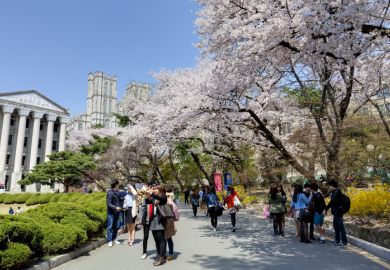Paul Cornish finds the life of a dedicated distributor of atomic weapons shows the futility of efforts to contain the technology.
Dame Eliza Manningham-Buller, the head of Britain's MI5 security service, spoke recently of the threat from terrorist use of chemical, bacteriological, radiological and even nuclear weapons, warning that the danger was "serious" and "growing", and might last a generation.
Alarm bells must be ringing in high places. And for very good reason, if Gordon Corera's Shopping for Bombs is anything to go by. This meticulously researched book paints a picture of runaway, free-market, knowledge-based nuclear proliferation. Corera's docu-thriller could well become the next James Bond movie, the opening scene of which would be an open stable door swinging as the wind blows.
Shopping for Bombs is the biography of a dedicated and determined proliferator, Abdul Qadeer Khan. It is also a study in the breakdown of the nuclear non-proliferation regime. In the early 1970s, having completed his education as a metallurgist in Europe, Khan began his career in a Dutch research laboratory. The lab was part of the UK-Germany-Netherlands Urenco consortium, which was then developing centrifuge enrichment technology for nuclear fuel. At about the same time, Khan began what was to be a 30-year career as a spy, a proliferator, a weapons dealer and, eventually, a merchant of nuclear weapons expertise. His determined pursuit of nuclear-weapon status for Pakistan led him to become head of his own Khan Research Laboratories, where he employed thousands of scientists and established his reputation as the "father" of Pakistan's nuclear weapon and of the missile systems that might deliver it.
Neither the prestige and adulation he received in Pakistan nor the lucrative arms deals he brokered were enough for Khan. He built up an international nuclear proliferation network in which he was able to make full use of his knowledge and his contacts. Khan helped Iraq, Iran and North Korea, and he is thought to have taken eight years off Libya's nuclear weapons programme, which has since been abandoned. Another major nuclear weapon deal was in the making just as Khan's network was dismantled. The identity of this customer remains a mystery, but it might be among the list of countries he visited shortly before his activities ceased: Egypt, Ivory Coast, Kazakhstan, Kenya, Mali, Mauritania, Morocco, Niger, Nigeria, Saudi Arabia, Senegal, Sudan, Syria and Tunisia. Khan's proliferation network created a free market for nuclear weapons expertise.
In so doing, as Corera observes, he brought the international nuclear non-proliferation system "to its knees". We might never know the extent of the damage done.
"Damage done" or "success achieved"? Khan's career offers a vivid explanation of the intellectual and diplomatic fragility of the nuclear non-proliferation regime. "Proliferation" is, of course, a heavily laden term; it is what cancer cells do, and it is how to describe "nuclear have-nots" seeking to become "nuclear haves". For those concerned about preventing nuclear weapons proliferation, Khan is, in the words of a former director of the CIA, "at least as dangerous as Osama bin Laden". But for those who reject the discriminatory norm (can there be such a thing?) at the heart of the non-proliferation regime, the acquisition of nuclear weapons is the fulfilment of national destiny, and Khan is a hero. In 1979, Khan published a vehement challenge to the West, in words that make for uncomfortable reading: "I want to question the bloody holier-than-thou attitudes of the Americans and the British. These bastards are God-appointed guardians of the world to stockpile hundreds of thousands of nuclear warheads and have the God-given authority of carrying out explosions every month. But if we start a modest programme, we are Satans, the devils."
Just as the full extent and effect of Khan's network are not known, so it is impossible to be sure that there are no other similar networks in operation or under construction. Governments of the G8 countries, including that of the UK, are helping to stabilise the social and economic conditions of the ten nuclear "closed cities" of the former Soviet Union, to prevent the haemorrhage of nuclear weapons expertise. This is an enormous undertaking, but a necessary one. By the late 1980s, the closed cities employed roughly 150,000 people. By 2012, Russia's goal is for this figure to have fallen to about 40,000. Thousands of those in search of new jobs are "proliferation-sensitive" nuclear weapon scientists, engineers and technicians. The prospect that even a handful of these people might take their knowledge abroad in search of gainful employment, or be recruited into a Khan-style nuclear proliferation network, is scarcely reassuring.
Khan's activities exposed fundamental flaws in the nuclear non-proliferation regime. The world would doubtless be a better place if no country had nuclear weapons or wanted to acquire them - better still if nuclear weapons had never been and could never be invented. But this is wishful, without much thinking. For more than 60 years, strategic doctrine has followed an entirely different trajectory, whereby the possession of nuclear weapons has been rationalised positively in terms of mutual deterrence, stability and security. And prestige - in 1958, Prime Minister Harold Macmillan argued that Britain needed nuclear weapons because they "put us where we ought to be, in the position of a great power". With the value of nuclear weapons being emphasised so strongly, the possibility that some outside the nuclear club might come to similar conclusions was somehow overlooked. The basic premise of nuclear non-proliferation now seems risibly naive: that if civil nuclear technology could be exported under controlled circumstances, then non-nuclear weapon states would be content that they had all the benefits of nuclear technology and none of the risks, which would remain the concern of those states carrying mankind's burden of nuclear weapon possession. To the extent that nuclear weapon proliferation has been contained over the past 60 years, this now seems attributable less to the moral force of the non-proliferation regime than to the geopolitical realities of the Cold War strategic balance.
For the early 21st century, the lesson of Shopping for Bombs is both that the boundaries between nuclear energy generation and nuclear weapon development have proved to be all too porous, and that the norms against nuclear weapon acquisition are not sufficiently sticky - defection has been too straightforward and arguably even rational. Khan's legacy is to have turned nuclear weapon expertise and technology into a commodity at a time when the non-proliferation regulatory framework - made up of treaties, export controls, end-user agreements and suchlike - is compromised. This is also a time when the incentives to proliferate, however perverse, are becoming ever stronger. It has often been asked, for example, whether the US-led coalition would have invaded Iraq in 2003 had Iraq been a nuclear weapon state. Does Libya's recent experience - ostensibly a victory for the non-proliferation school - suggest that it is cost-effective to begin a nuclear weapon programme then to renounce it in exchange for various benefits? And the agreement reached between India and the US earlier this year makes it difficult to see what the deterrent to nuclear weapon proliferation might be.
With the future looking so bleak, what should we expect of policymakers? The default response is to argue that an international non-proliferation consensus must be re-established as a matter of urgency. But it seems doubtful that there ever was much of a consensus to re-establish, or at least not one that could hold much sway after the Cold War. And in any case, it appears unlikely that this consensus could be revived without a radical change of policy by the established nuclear weapon states. But if nuclear weapons are spreading far and wide such a change of heart could be an act of supreme and possibly terminal idiocy.
This dilemma bears upon the controversy surrounding the UK's independent nuclear deterrent. It is unclear who or what would be deterred by a replacement of the country's Trident nuclear weapons systems. But it is at least possible that in a world where nuclear weapons are becoming more accessible, it could be a Trident-less UK that is deterred and coerced by the nuclear arrivistes. It might then be prudent to accept the fact of nuclear proliferation and even the likelihood of nuclear use and try, where possible, to spread the word of mutual nuclear deterrence as the best form of prophylaxis. And since prophylactics can fail, missile defences could be useful, as would the ability to decontaminate large urban areas. But this is a counsel of despair and the surest way to bring about a complete free-for-all in nuclear weapon proliferation.
The nuclear non-proliferation regime is no longer sufficient to the task; it has become a club for nice people who obey the rules, but it has too little authority over those who cheat, who cancel their membership or who decide not to join in the first place. Yet for all its deficiencies, the regime embodies a norm that cannot be abandoned, least of all at its moment of greatest challenge. It is becoming ever clearer that the regime needs sharp teeth; as the proliferation of nuclear weapons continues and nuclear use becomes ever more likely, the members of the club must be willing to act in concert against the proliferators, through financial sanctions, initiatives such as global nuclear clean-up and the Proliferation Security Initiative, and even with the use of armed force if necessary. There is an obvious, in-built contradiction here. The outcome might be the end of any possibility of a global non-proliferation consensus; the regime will appear as discriminatory as ever, the world will feel less secure and nuclear acquisition will appear yet more attractive in some quarters. But uncritical faith in the universal political and moral authority of the non-proliferation consensus is no longer good enough. Paradoxical and hypocritical though their position will appear, the limited membership of the nuclear club might have to behave more like the "bastards" described by Khan if they are to achieve some level of security and if the nuclear non-proliferation norm is to be worth the candle.
Paul Cornish is the Carrington chair in international security and head of the international security programme at Chatham House.
Shopping for Bombs: Nuclear Proliferation, Global Insecurity, and the Rise and Fall of the A. Q. Khan Network
Author - Gordon Corera
Publisher - Hurst
Pages - 288
Price - £16.95
ISBN - 1 85065 826 9
Register to continue
Why register?
- Registration is free and only takes a moment
- Once registered, you can read 3 articles a month
- Sign up for our newsletter
Subscribe
Or subscribe for unlimited access to:
- Unlimited access to news, views, insights & reviews
- Digital editions
- Digital access to THE’s university and college rankings analysis
Already registered or a current subscriber?



